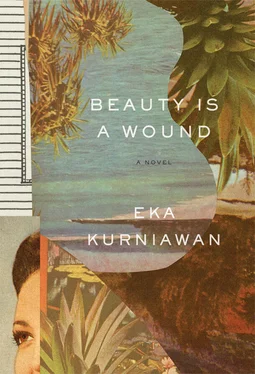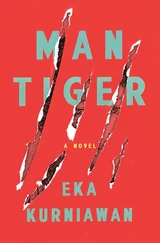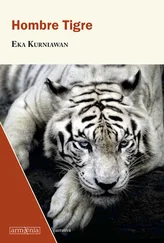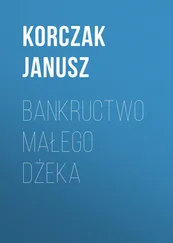“The 23rd of September.”
“So we are more than a month late.”
“For what?”
“For the celebration.” Then he read them what was printed on the dead man’s leaflet. “PROCLAMATION: WITH THIS WE THE PEOPLE OF INDONESIA DECLARE OUR INDEPENDENCE… AUGUST 17, 1945. IN THE NAME OF THE INDONESIAN PEOPLE, SUKARNO & HATTA.”
There was a moment of silence, before they broke out into a cacophony of whoops and shouts. Except for Shodancho, they all ran and danced in front of their guerrilla huts as if possessed, singing victory songs. Without one order, they gathered up their things and started packing, as if everything had come to an end. They were ready to run out of the jungle and burst into the city to bring the joyful news, but Shodancho quickly headed them off before the insanity spread any further.
“We have to have a meeting,” he said.
They complied and gathered in front of the hut.
“There are still many Japanese in Halimunda,” said Shodancho, “and they must already know about this, but they have chosen to remain silent.” He quickly came up with a strategy. Half of them had to carry out a lightning attack on the post office, taking hostages if necessary, which wouldn’t be too dangerous because all the post office employees were natives. There was a mimeograph machine there and they had to print up the dead man’s note and disseminate it to the entire city as quickly as possible. “Use the mailmen!” he said confidently. The other half of them had to infiltrate the daidan and tell them what had happened, disarm the Japanese, mobilize the masses, and hold a huge gathering at the soccer field. After that quick and concise meeting, they emerged from the jungle.
The simple fact of their arrival in the city put everyone into a frenzy, even before the leaflet printed at the post office was swiftly shared. Shodancho was able to commandeer a truck and circle the city shouting, “Indonesia declared independence on August 17, Halimunda followed suit on the 23rd of September!” Everyone standing on the edge of the road froze, as if turned to stone. A barber almost snipped off his customer’s ear, and a Chinese bakpao seller lost control of his bike and went rolling along with his steamed buns. They all looked at the passing truck in disbelief, and then snatched up the scattered leaflets and read them. Rejoicing broke out — the elementary school kids began dancing by the side of the road, and then all the grown ups joined in.
The Japanese came out of their offices, including the army commander Sidokan. They were helpless when they found out what had happened, and put up no protest when the Peta soldiers from the daidan appeared to strip them of their weapons. Without the proper ceremony the rebels lowered the Hinomaru while yelling in the faces of the Japanese, “Eat this accursed flag!” They then exchanged it for the Red and White in a solemn ceremony, singing the anthem Indonesia Raya .
People began to gather in the soccer field, emaciated and dressed in rags, but still looking radiant. Never in their lives, and never in their grandparents’ or great-grandparents’ lives, had there ever been independence. But that day they heard it for themselves: Indonesia was free, and so of course was Halimunda. Shodancho led another flag-raising ceremony in the afternoon, again reading the proclamation, while the people of the city sat cross-legged on the grass and the members of the military stood at attention, tall and stiff. Starting that year and for many years to come, only schoolchildren and the army commemorated the proclamation every August 17. The citizens still conducted their own private rituals on September 23, and after a while the schoolchildren and the military joined in. That day they did not just salute the flag and read the text of the proclamation while singing Indonesia Raya , but also sent each other gift baskets of food and held a street fair. And if a stranger asked, or if a teacher asked his pupils when Indonesia gained its independence, they would always say, “The 23rd of September.” The central government made a number of attempts to clear up the confusion about the delay in information in the year 1945, but the citizens of Halimunda swore to the death that they would always celebrate Independence Day on September 23. After a while nobody made a big deal about it anymore.
A commotion broke out when a group of people came dragging the daidancho and it appeared that he was to be viciously executed on the grounds of committing treason during the rebellion. They were ready to hang him under a catappa tree that grew in a corner of the soccer field, but Shodancho put a stop to their proceedings. He released the daidancho and brought him to the center of the field. He already knew about the man’s treason, and for that he gave him a revolver. Heard by all the people who swarmed around them, he said:
“We were both educated by the Japanese, so you know as well as I do what a traitor must do.”
The daidancho put the pistol to his head and ended his own life. Even still, Shodancho ordered all the soldiers to conduct the ritual of the final salute, and the corpse was wrapped in a flag and buried in a plot of land not far from the city hospital, the precursor to their military cemetery. His was the only death that day. Shodancho took over all the daidan ’s power, quickly sent a number of couriers to gather more information, and working with the city folk, he fixed the bridge that he himself had once destroyed. Two days later the couriers returned, saying that Peta had been disbanded and all the daidan had been turned into the Agency for the Safety of the People.
So they formed the Agency for the Safety of the People. But two days after that, another courier came and said that the Agency for the Safety of the People had already been disbanded and changed into the Army for the Safety of the People.
“If it gets changed again,” Shodancho said annoyed, “Halimunda is going to go to war against Indonesia.”
The central government made decisions about the distribution of rank. Shodancho, surpassing the commanders from the other shodan , was given the rank of lieutenant colonel and his dumb friend, Sadrah, felt satisfied as Major Sadrah. But Shodancho didn’t pay too much attention to such matters, and told everyone, “I prefer to remain just Shodancho.” A few weeks later, another courier came bringing a parcel containing a letter, which seemed to have been written many months ago and was only just now arriving at its destination, from the president of the Republic of Indonesia, addressed to Shodancho. Pretty soon everyone in the city knew what it said: the president had designated Shodancho as the great commander of the Army for the Safety of the People with the rank of general, in recognition of his heroism in leading the February 14 Rebellion.
While the city folk were celebrating his nomination as great commander, Shodancho disappeared to his old guerrilla hideout. That whole day he fished and swam in the ocean alone, meditating while floating on the surface of the water as if he himself was a drowned corpse. He didn’t want to think about the nightmare of becoming the great commander of the Army for the Safety of the People. Before his departure, he said to Major Sadrah, “How sad to know that I was the first person to rebel, and because of that I was chosen to become the great commander. I have wondered what kind of army we have, to choose a man who hasn’t ever even seen a woman’s private parts up close as a great commander.” As day turned into night, his friends discovered him and brought him home.
A while after that, he got news from another courier, which came as a welcome relief. Noting that the great commander’s chair had not been sat upon by Shodancho even once, the division commander and the commander of the islands of Java and Sumatra held a powwow to look for his replacement. “The president of the republic has already chosen Colonel Sudirman as commander of the Army for the Safety of the People with the rank of general,” announced the courier.
Читать дальше











